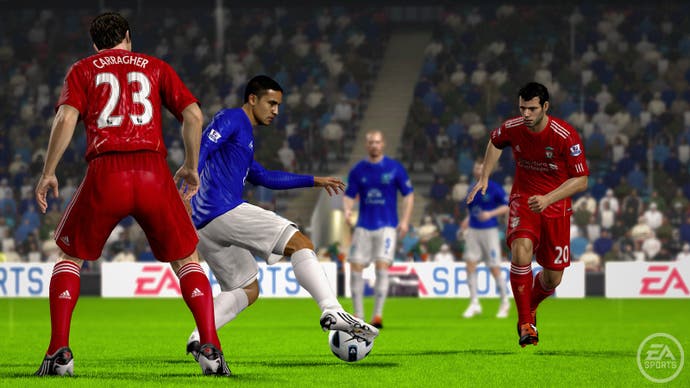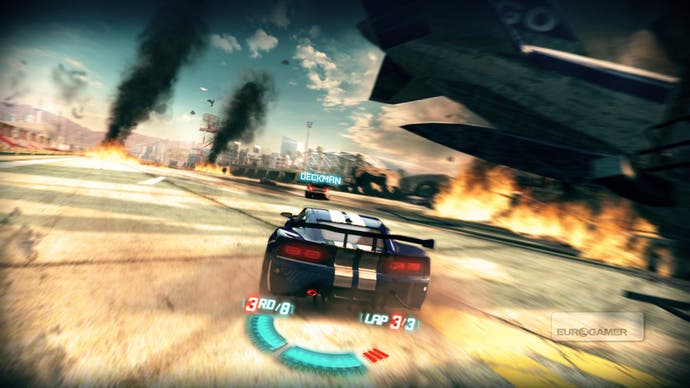Fingers on the pulse
Which games get your heart racing the most?
FIFA 11
It took just one end-to-end match on FIFA to really get my heart rate up and keep it there. Over the course of a couple of hours of play, complete with dirty tackles, some absolute screamers and a few dodgy refereeing decisions, there was between a 40 and 50 per cent increase in my resting heart rate, on average.
There were also plenty of spikes which coincided with the tension of a competitive match. In other words, my heart reacted in exactly the same way it would during the highs and lows of a real game of football.
A note about online play
The real eye-openers were reserved for when I went online. Even as I sat in the pre-game lobbies with conductive pads on my chest and notebook at my side, my heart rate started to creep up. It seemed that simply the anticipation of pitting myself against real-life opponents was enough to get my juices flowing.
But that was nothing compared to what happened when the action kicked off. Playing both Split Second and Left 4 Dead 2, I recorded highs of 93 and 89 BPM respectively. It seemed like the constant tension involved with facing off against my peers was doing the trick in a way that the solo action just couldn't achieve.
FIFA produced similar results. I consistently racked up 50 per cent-plus increases to my resting rate. The frenzy of a Black Ops firefight pushed my heart even harder, with several recordings reaching well over 100 BPM.

Aside from the strain the games were putting on my heart, I also noticed that my little online session had caused a few physical side effects. Whether it was a result of a prolonged day of digitised action or simply the flood of adrenaline coursing through my system, I was noticeably twitchy once I'd laid down the controller for the final time. I even had a touch of the shakes.
What does it all mean?
All I can tell you is that the more my heart rate shot up, the more involved I was with the action and the harder it was to tear myself away from my machine. Luckily Professor Mark Griffiths, director of the International Gaming Unit at Nottingham Trent University, was on-hand to help me make sense of it all.
Griffiths is something of an expert on this subject - so much so that he was called to talk about why games were addictive on that Panorama special. The programme aired, as fate would have it, right in the middle of my own experiments.
Turns out my elevated heart rate was a result of my body being flooded with adrenaline and endorphins, due to the sheer excitement of the games. "Increased excitement and arousal can become very physiologically rewarding for players," Griffiths said.
"This may be part of the explanation why some people become addicted to video gaming as they are addicted to the chemicals, such as the morphine-like endorphins, that the body releases in states of high arousal."
Simply put, the more engrossed I was in the action the more excited I got, and the more of these chemicals my body produced. It was these chemicals that were contributing to my enjoyment of the experience and made it harder for me to tear myself away from the action, as I wanted more of them.
This is similar to the situation experienced by gamblers or, to a lesser degree, extreme sports enthusiasts. Enjoyment of their pursuit comes from their physiological reaction to the excitement, risk and reward of their exploits.

But why the increase in heart rate when I went online? Traditionally we've played games for the rewards, whether that's improving our high scores or completing the story. But playing online we experience what the Professor calls the "partial reinforcement effect", where our rewards are intermittent.
Here, there is no definite conclusion to the experience. This potential to play on endlessly means we get drawn into the "just one more go" cycle. We keep playing in the hope that the next reward or achievement will be just around the corner.
So does this mean we're all addicted to games? Well, despite what some of the scare stories in the mainstream media might have you believe, no. "Playing excessively does not mean someone is addicted," said Griffiths.
"Games can be immensely rewarding and psychologically engrossing, and for a small minority of people, this can lead to addiction. Most of these addicted individuals have susceptibilities and vulnerabilities which when combined with the structural characteristics of the game itself can lead to addiction in a minority of cases."
There is a serious point here. Despite the inherent susceptibility of the unfortunate few who are on the slippery slope to addiction, surely the industry has to take responsibility for the potential impact of its products?
After all, designers know exactly what they're doing when they're building this aspect of engagement into the game. Perhaps, as with the the alcohol and gambling industries, the onus should be on them to warn gamers of the potential dangers of using their product.
What of the rest of us, those who can spot the fine line between addiction and excessive enjoyment? Games can be a wonderful thing. They can give people purpose, they can bring people together and they can be a hell of a lot of fun. But the moral of the story, as you might have spotted a few paragraphs ago, is to enjoy games in moderation, and know when to stop.
Now leave me alone, I need another 8000 XP to unlock an AK-47.







